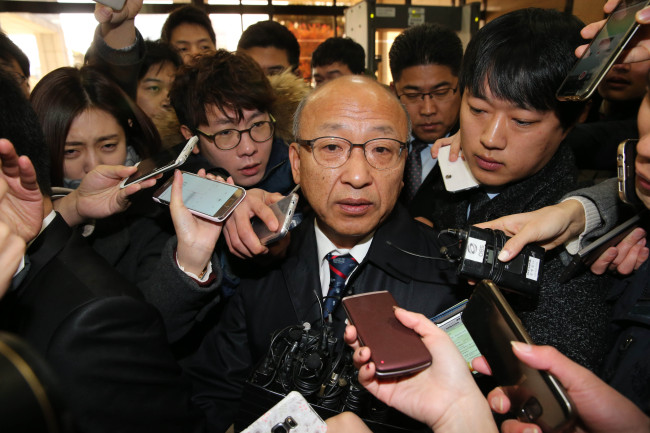NPS chairman quizzed over Samsung C&T merger
Legal experts raise possibility of Elliott seeking ISD lawsuit
By 조정은Published : Nov. 24, 2016 - 17:46
The prosecution questioned Moon Hyung-pyo, chairman of the National Pension Service, Thursday over alleged irregularities surrounding the high-profile merger of two Samsung affiliates last year.
Moon was welfare minister when the state-run pension operator backed Samsung C&T’s attempt to incorporate Cheil Industries despite strong opposition from advisory groups and some shareholders.
The prosecution questioned Moon as to whether he was pressured by Cheong Wa Dae to push the NPS to exercise its voting rights in favor of Samsung. NPS, the largest institutional investor of Samsung C&T, is under the control of the Ministry of Health and Welfare. In August last year, Moon left the ministerial post to take responsibility for the mishandling of the Middle East respiratory syndrome that had hit the country hard and exposed the government’s poor management on containing fatal viruses.
Expressing bewilderment, the former welfare minister refuted allegations, saying he had nothing to relate on the matter.

“I feel a little confused. I was not in a position to involve myself in the course of the merger,” Moon told reporters before entering the Seoul Central Prosecutors’ Office.
“(NPS’) asset management division was in charge of the case, I never expressed any opinion,” he said, adding he was briefed on the case later and heard the NPS’ decision had no procedural problems.
The prosecution’s summoning of Moon came a day after it raided the offices of Samsung Group and the NPS over allegations that the pension fund supported the South Korean conglomerate’s merger plan under political influence.
The probe, initiated by an all-out investigation into President Park Geun-hye’s longtime friend Choi Soon-sil, has sparked questions again over the motive of the landmark deal.
The deal was widely seen as a crucial part of Samsung’s succession scenario that involved transferring power from the bedridden Chairman Lee Kun-hee to his only son, Lee Jae-yong.
Individual shareholders led by US hedge fund Elliott Associates, however, had strongly opposed the deal, saying it would damage shareholders’ value and that the power transfer scheme should not overstep shareholders’ rights.
The merger between Samsung C&T and Cheil Industries, through a stock-for-stock transaction with a ratio of 1:0.35, was approved with the support of the NPS.
But questions have remained over the NPS’ decision, as the state fund exercised its voting right after a review by an internal committee, not by an independent panel, and as the ratio of the merger itself was considered disadvantageous for Samsung C&T shareholders. Before the merger, the NPS held an 11.6 percent stake in Samsung C&T and a 5 percent stake in Cheil Industries.
Investigators are looking closely into the nature of Samsung’s huge donations to two foundations allegedly operated by Choi and separate funds given to a paper company in Germany set up by Choi and her daughter, over allegations the money was linked to the NPS’ backing of Samsung last year.
Samsung strongly denied the allegations, saying the group lobbying Choi or President Park for business favors would be “impossible.”
Citing the time line of the merger, Samsung said that the merger deal was approved by shareholders two weeks before Park met the group’s heir apparent Lee Jae-yong on July 24.
The group also refuted suspicions concerning Lee’s meeting with NPS’ asset management head Hong Wan-sun, just before the pension operator exercised its voting rights, saying that it was a customary event between a company and an investor.
Meanwhile, amid intensifying controversy on Samsung’s merger deal and the NPS’ role, legal experts raised concerns that Elliott Management, the US hedge fund that strongly opposed the merger, might consider filing a suit against the South Korean government if the NPS is convicted of having made such a decision under political pressure.
Under the stipulations in the Korea-US Free Trade Agreement, US companies can file suits to third-party arbitration tribunals, if treated unfairly.
Elliott, through its public relations representative in Seoul, declined to comment on the ongoing probe.
By Cho Chung-un (christory@heraldcorp.com)




![[Herald Interview] 'Amid aging population, Korea to invite more young professionals from overseas'](http://res.heraldm.com/phpwas/restmb_idxmake.php?idx=644&simg=/content/image/2024/04/24/20240424050844_0.jpg&u=20240424200058)












![[KH Explains] Korean shipbuilding stocks rally: Real growth or bubble?](http://res.heraldm.com/phpwas/restmb_idxmake.php?idx=652&simg=/content/image/2024/04/25/20240425050656_0.jpg&u=)

